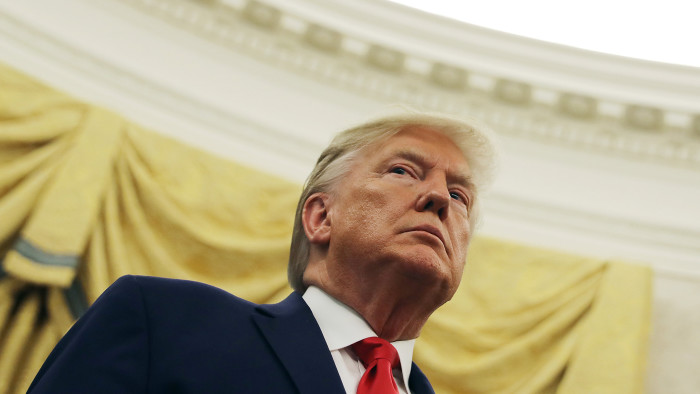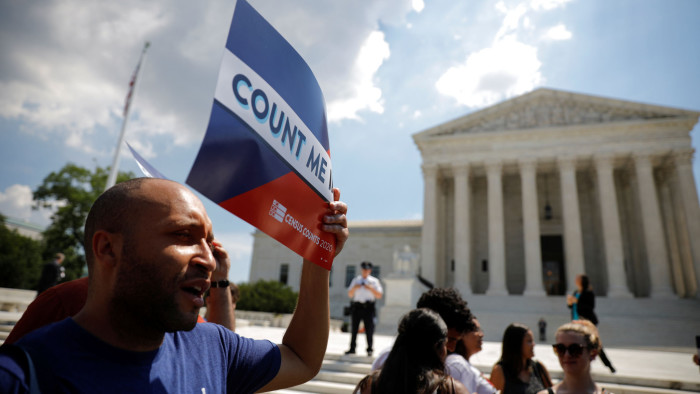Forcing the White House to disclose truth on immigration

Roula Khalaf, Editor of the FT, selects her favourite stories in this weekly newsletter.
The administration of President Donald Trump has, periodically, made sweeping decisions designed to deliver on campaign promises to put “America first”. Immigration policies have presented low-hanging fruit and are easy targets for reform.
The Trump White House generally provides a legal justification for its decisions. When the administration moved to eliminate the Temporary Protected Status (TPS) of Haitians, it argued that Haiti was now a safe country to return to. In its attempt to add a question about citizenship to the 2020 US census, it cited the Voting Rights Act (VRA), arguing that it was protecting minority groups from having their voting rights diluted or marginalised.
However, lawyers say these policy changes are designed to have a disproportionate effect on minority or immigrant communities, and their declared rationale is often a veneer for anti-immigrant intent.
Lawyers have been essential in exposing the administration’s underlying motivation for policy changes, using the discovery process to gain access to documents that prove it.
The Trump campaign was explicit about its anti-immigrant sentiment, says Howard Roin, partner at law firm Mayer Brown. Mr Trump reportedly referred to an assortment of nations as “shithole countries” in a closed-door meeting on immigration with lawmakers — a comment the president has denied.
In January 2018, when the administration eliminated TPS for people from Haiti, El Salvador, Nicaragua and Sudan, lawyers were shocked. TPS is a designation applied to countries that, because of war, natural disaster or humanitarian emergency, are no longer considered safe enough for citizens abroad to return to. Haiti received TPS status after the 2010 earthquake that killed an estimated 230,000 people.
While previous administrations have eliminated TPS with little fanfare, “the fact that multiple countries were done at once within a short period of time is what was remarkable, that’s what set off alarm bells,” says Geoffrey Pipoly, a senior associate at Mayer Brown, which filed a legal challenge in the case of Haiti.
There was no legal precedent for challenging the termination of a TPS designation, says Miriam Nemetz, a partner at Mayer Brown. “Terminating TPS requires that it be safe for people to return. The fact is that the conditions in Haiti were terrible.” She adds: “It was clear that something was going on.”
A TPS designation itself cannot be challenged so lawyers turned to the government’s decision-making process and how it established whether the conditions continued to exist for TPS in Haiti. Lawyers used discovery to gain access to the documents that underpinned the TPS decision. This showed, the judge later said: “[Department of homeland security] officials were proactively mad-libbing official documents to reach termination [of TPS].”
When officials first ordered an analysis of conditions in Haiti, the information in the report was overwhelmingly in support of the continued need for TPS. Robert Law — a senior immigration services adviser who had previously worked for an anti-immigration organisation described as a hate group by the Southern Poverty Law Center, a non-profit organisation — said that the subsequent report recommending the continuation of TPS was not what the Trump administration was “looking for”.
Exactly 29 minutes later he sent the letter back to his supervisor, revised to exclude information supporting TPS. He later directed a subordinate to “be creative” in finding data to argue that TPS should be eliminated.
These memos — as well as handwritten notes by Elaine Duke, acting deputy secretary of homeland security, which outlined the decision-making process — were made available to lawyers in discovery. Ms Duke wrote of her rationale for terminating TPS in Haiti: “Don’t know, need to rationalise conflicting info.” US Citizenship and Immigration Services declined to comment.
Lawyers at Mayer Brown argued that in the case of Haiti, the government edited available information in order to engineer the outcome of eliminating TPS rather than basing the decision on facts, as required by law.
Mr Pipoly says: “You rarely end up being as right as we were in this case.” The release of the documents from within the administration, he says, “is a good illustration of the fact that there are still people in government who are there to do the work of government. People that, when asked to present documents, just do it”.
The Trump administration’s attempt to add a question about citizenship to the 2020 census, citing the VRA, also triggered alarm. “For people who work on [voting rights] for a living it was doubly galling,” says Dale Ho, director of voting rights at the American Civil Liberties Union.

The constitutional purpose of the census is to count every person in the US at a given moment, regardless of citizenship. The census plays a big role in the US political framework, from establishing government representation and power within states to determining funding allocations. A question about citizenship posed a risk to a fair census count because immigrants feared that the information would be used to enforce immigration rules.
The ACLU worked with law firm Arnold & Porter to pose a legal challenge under a statute that allows aggrieved parties to see how a decision was made. Lawyers believed that the documentation would reveal the true reason the citizenship question was being added.
Legally, any changes to the census must come from outside the Department of Commerce, which controls the census.
By forcing the government to turn over the administrative record, lawyers established that the request was choreographed to look as if it was an independent request from the justice department, when it had in fact come from the political leadership within the commerce department itself. “Every living census director from both political parties said adding this question was a bad idea,” says John Freedman, partner at Arnold & Porter. “[The department] didn’t do anything to test this question when any change to the census questionnaire is usually a 10-year process where they test it repeatedly.”
The discovery process also revealed a smoking gun: documents existed that had not been shared initially.
The government had “curated documents to provide a misleading picture”, says Mr Ho. Lawyers used that information to retrieve previously withheld documents. The final record was more than 10 times as long as the 1,300 pages initially provided by the administration. These documents “allowed us to build this case brick by brick,” says Mr Ho. The Supreme Court blocked the question from being added to the 2020 census. The Department of Commerce said in a statement that it “acted in good faith and in consultation with counsel at the Department of Justice”.
“The only way you can hold those agencies accountable to Congress and the public is if they are transparent and honest about the reasons why they do things,” says Mr Ho. None of the information was publicly available, he adds. “It took litigation to bring all of that to light.”
The table below ranks law firms for the FT Innovative Lawyers North America awards.
Explore the Innovative Lawyers North America rankings 2019

Overall
- Most innovative law firms
- Most innovative in-house legal teams
- Rule of law and access to justice
- Collaboration
Business of Law
- Technology and data
- New business and service delivery models
- New products and services
- Talent, strategy and changing behaviours
- Diversity and inclusion
Legal Expertise
- Accessing new markets and capital
- Creating a new standard
- Enabling business growth and transformation
- Litigation and disputes
- Managing complexity and scale
Comments